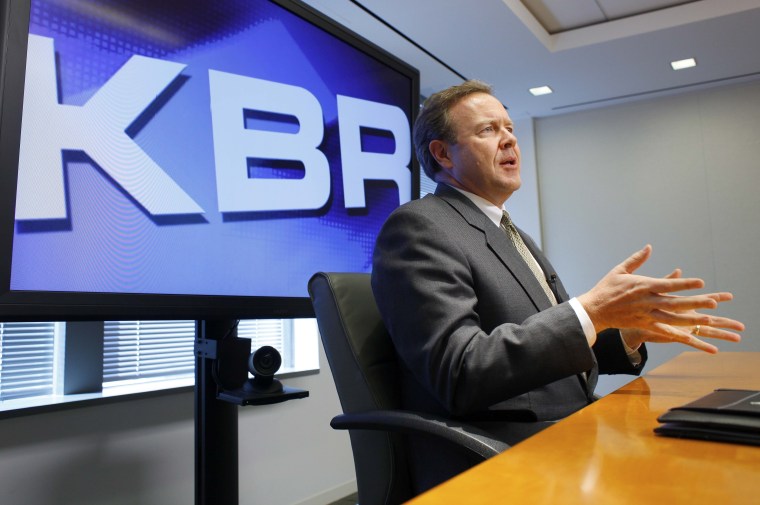The chief executive of the military contractor under scrutiny in the electrocution of U.S. troops in Iraq said Wednesday the electrical codes it used in the buildings it maintained in the war zone "were known and thought to be acceptable" by the Pentagon.
William P. Utt, the chairman of Houston-based KBR Inc. told The Associated Press in an interview that the company was not expected to meet the U.S. electrical code in a wartime environment. He said the company was striving to meet the British electrical code, which was more in line with the Iraqi electrical system.
Earlier Wednesday, Jim Childs, an electrical inspector hired by the Army to help review U.S.-run facilities in Iraq testified before the Democrats' policy committee that 90 percent of KBR's wiring in newly constructed buildings in Iraq was not done properly, meaning an estimated 70,000 buildings where troops lived and worked were not safe.
"When I began inspecting the electrical work performed by KBR, my co-workers and I found improper electrical work in every building we inspected," Childs said.
Not 'potentially dangerous'
Utt said KBR is working with the U.S. military to improve the wiring, now that Iraq is more stable.
"We believe the standards that we did employ were standards that were known and thought to be acceptable in an expeditionary environment," Utt said during the interview, conducted with a group of AP reporters and editors.
"We don't think the wiring that we installed was potentially dangerous," he added.
Utt said KBR should be afforded a measure of protection from lawsuits over work it performs for the military.
"We are working for the government, taking a lot of instruction from the government," Utt said. "We think there ought to be some consideration given in many of these claims to the same protections the government has from these suits that exist."
At least three U.S. troops have been electrocuted while showering in Iraq, and others have been injured and killed in other electrical incidents. KBR, which maintains electrical work in tens of thousands of U.S. facilities in Iraq, has denied responsibility in the deaths.
'Continuing quality deficiencies'
In strongly worded correspondence last fall, a senior Pentagon official, David J. Graff, told KBR there were "continuing quality deficiencies" in the electrical work it performed. He said KBR executives were "not sufficiently in touch with the urgency or realities of what was actually occurring on the ground" and that some military officials had lost confidence in KBR.
Despite those concerns, KBR was awarded a new $35 million contract earlier this year for a project in Iraq that included electrical work.
Sen. Byron Dorgan, D-N.D., who chairs the policy committee, said at the hearing that evidence suggests KBR's work was involved in some of the deaths. He said that documents show that KBR was paid $83.4 million in bonuses for electrical work in Iraq — much of it after the military's contract management agency recognized KBR was doing shoddy electrical work.
He said $34 million in bonuses was paid to KBR three months after Green Beret Staff Sgt. Ryan Maseth, 24, of Pittsburgh, was electrocuted while showering in his barracks in Iraq on Jan. 2, 2008.
Maseth's family has sued KBR, alleging wrongful death. Military criminal investigators are looking into his death and four others.
"How could it be that, given these obviously widespread problems with KBR's electrical work, the Pentagon decided to give KBR bonuses totaling $83.4 million for such work?" Dorgan said.
In a letter Tuesday to Dorgan distributed at the hearing, Deputy Secretary of Defense William Lynn denied that KBR received any such bonuses for work performed after Jan. 1, 2008, and said no additional such awards will be given until a comprehensive review is conducted.
Utt said the company worked with the military on the electrical issue, and he anticipates it will again soon receive "award fees." He said the fees are paid according to KBR's performance on a variety of jobs, not just for the electrical work.
Childs, the inspector, worked in Iraq for the military's Task Force SAFE, which was created last year to inspect and oversee repairs in about 90,000 U.S.-maintained facilities in Iraq. The AP previously reported that about a third of the inspections conducted have so far turned up major electrical problems.
